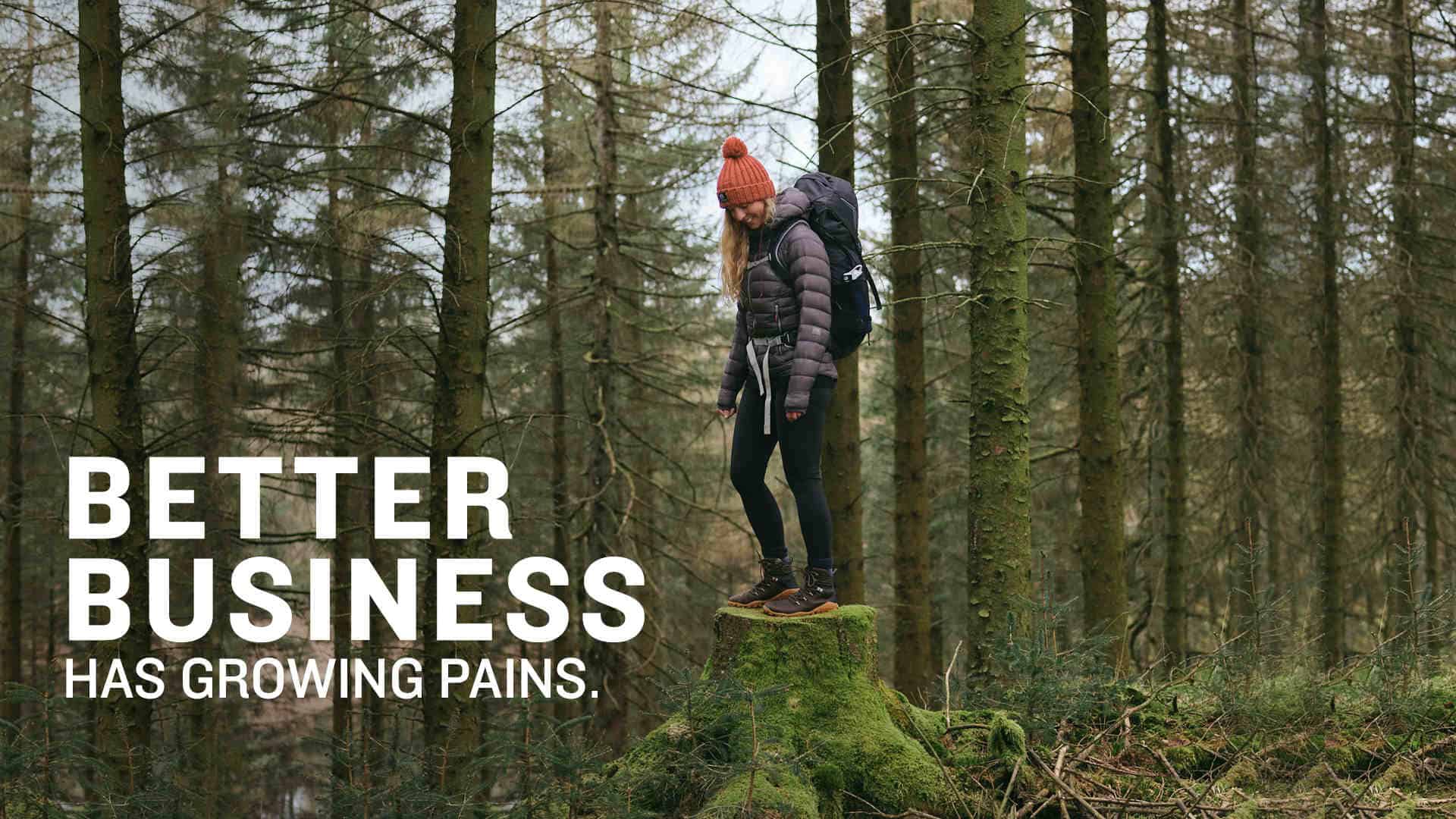Transparency in Regenerative Business

The rise of regenerative business
Business is experiencing an ethical boom. Take the number of certified B Corps in the UK, which has more than doubled since 2018 to a total of 600 and counting. Meanwhile, research from the Better Business Act – which is calling for implementation of laws to require companies to take ownership of their social and environmental impact – reveals that 76% of Brits want businesses to be legally responsible for their impact. And, according to the Co-op, Britain’s ethical spending has hit a record high of £122 billion, suggesting consumers are increasingly aligning their purchases with their values. All signs point to one truth: it’s cool for corporates to care.
What do we mean by ‘better business’?
The phrase ‘better business’ is bandied around continuously – but what does it actually mean? The B Corp movement is committed to demystifying the road to regenerative business, and this year’s B Corp Month sets out to do exactly that. The theme is ‘Behind the B’, inviting us behind the scenes ‘to uncover what makes a B Corp a better business’. The aim, according to B Lab, the organisation behind the certification, is to demonstrate how companies of all shapes and sizes are making business a force for good – and how B Corps are committing to continuous improvement.
The latter part of that aim is key. Any business that has been through the B Corp certification process (Greenhouse Communications included) knows that things don’t stop at certification. Being a B Corp means signing up to a continual process of self-evaluation, reflection and iteration. That means evaluating wins, but also failures – the acknowledgement of which leads to change. Transparency is the order of the day.
Transparency means celebrating success and acknowledging failures
That’s the spirit with which envelope-pushing shoe brand and certified B Corp Vivobarefoot has approached its impact reporting, which it describes appropriately as ‘veruccas and all’. Not content with merely sharing last year’s champagne moments, the company’s latest impact report – aptly titled ‘Unfinished Business’ – dedicates a double-page spread to its ‘Fantastic Failures’: the things it didn’t quite get right or failed to do last year, and how it plans to change this.
‘Conventional business has got it wrong – simply doing more of the wrong things, righter.’ That’s the assessment of Galahad Clark, CEO and Co-Founder of Vivobarefoot. ‘Let’s stop celebrating that and get on with exponentially rewilding the world around us.’ His call to action is a galvanising one, and hard to argue with in light of the IPCC’s latest proclamation that any further delay in global action on climate change ‘will miss a brief and rapidly closing window of opportunity to secure a liveable and sustainable future for all’. In response to indisputable evidence of environmental degradation at the hands of human systems, Vivobarefoot’s impact report attempts to show just how the business intends to work to rectify that – and what needs to change as a result.
View this post on Instagram
Behind the B – the businesses striving for transparency
Vivobarefoot is just one of many B Corps committed to this level of transparency and progress. Read on for a run-down of four other businesses we admire for continually holding themselves accountable – and evolving in the process.
Riverford Organic Farmers
Organic veg box delivery business Riverford is committed to ‘greener veg with no greenwash’. Its 2021 sustainability report begins with an assessment of the previous year’s targets, identifying where the company made inroads, and where there’s still room for improvement. The report goes on to devote a double-page spread to Riverford’s B Corp certification, which it achieved in September 2020. The section includes the company’s score for each area under assessment, and identifies areas for improvement ahead of recertification.
Sustainability isn’t the only area in which Riverford displays transparency. The company, which became majority employee-owned in 2018, is committed to compensating its co-owners well for their labour. Recently the business increased its prices in response to rising costs of labour, packaging and transport. Founder Guy Singh-Watson was clear about the motivation behind this move. ‘I spent 20 years probably underpaying staff and suppliers,’ he admitted in a recent interview with The Grocer, ‘and I’m just not going to do it any more.’
Triodos Bank
Ethical bank Triodos has blazed a trail in the financial sector ever since it was founded in 1980. Now, with the finance world waking up to the growing popularity of impact-based investing, Triodos has much wisdom to share. The bank makes it clear that instead of being separated as a department or a function, sustainability ‘is intrinsic to everything we do in the organisation.’ Within its business principles, it emphasises the organisation’s commitment to being accountable to all stakeholders for its actions – as well as its commitment to continuous improvement. This includes publishing details of every organisation it lends to, allowing customers to see the impact their money is having, and hold the bank accountable for where it does and doesn’t invest.
‘We are in a state of climate emergency and the banking industry needs to radically transform to be part of the solution,’ Bevis Watts, CEO of Triodos Bank UK, has said. ‘Although we’re aware that the change cannot happen overnight, we’d like to see greater transparency from all banks in where they are investing their money, so that customers can make informed choices.’
Toast Ale
Toast Ale uses surplus bread to brew its beers in place of virgin barley, and donates all profits to charity, helping to fund systemic change to fix the food system – donating £74,148 in 2021 alone. Toast’s ethos centres on another form of transparency, encouraging knowledge-sharing amongst businesses. Having concluded that just 3% of its total greenhouse gas emissions for 2021 were Scope 1 and 2 (emissions from sources owned or controlled by our business) Toast has made a renewed commitment to working with its third-party suppliers to educate them on reducing emissions. This mirrors the work Toast does with its fellow B Corps and breweries, forging collaborations and sharing knowledge with businesses that others might see as its competitors. ‘One of the strengths of the B Corp movement is in the way that it is collaborative,’ Co-Founder and COO Louisa Ziane told us last year. ‘The businesses are very open to collaboration. And often those collaborations are happening between competitors. I think that’s really vital if we are to achieve the very ambitious goal to get to net zero by 2030.’
Ella’s Kitchen
Organic baby and toddler food business Ella’s Kitchen was founded with the aim of improving children’s lives through helping them develop healthy relationships with food. With its focus on the next generation, it’s no surprise that the business is invested in working towards a better future through adopting regenerative business practices. Like Toast Ale, Ella’s Kitchen is focused on communicating its B Corp journey to the business’s suppliers, extolling the benefits that operating regeneratively brings. Not only that, last year Ella’s joined forces with Nestle, Mars, Taylors of Harrogate and recycling experts SUEZ to form the Flexible Packaging Consortium, working together to explore the opportunities for how flexible packaging can be widely collected and recycled. ‘I think that’s the way we can really lead a massive change,’ CEO and Founder Mark Cuddigan told Greenhouse Communications last year. ‘Showing that this other way is not only a better way for the environment and people, but commercially it’s a better way too.’
Every March, B Lab and the global B Corp Community join together to celebrate what it means to be a B Corp and build awareness about the movement of people using business as a force for good.
Visit Behind the B to learn more about this year’s campaign, and use #BehindTheB to join the conversation.


